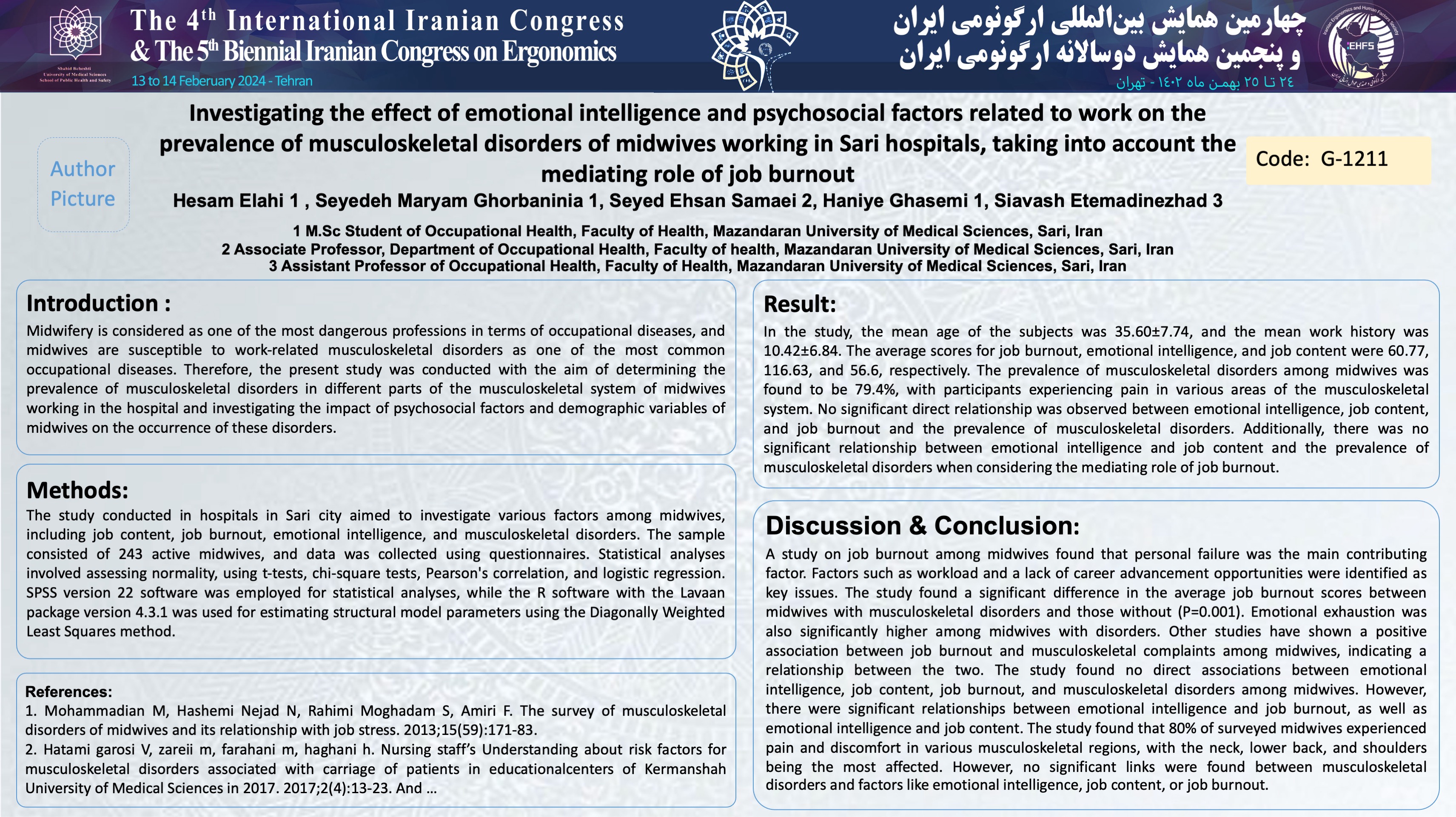Investigating the effect of emotional intelligence and psychosocial factors related to work on the prevalence of musculoskeletal disorders of midwives working in Sari hospitals, taking into account the mediating role of job burnout
Code: G-1211
Authors: Hesam Elahi ℗, Seyedeh Maryam Ghorbaninia, Seyed Ehsan Samaei, Haniye Ghasemi, Siavash Etemadinezhad ©
Schedule: Not Scheduled!
Download: Download Poster
Abstract:
Introduction
Midwifery is considered as one of the most dangerous professions in terms of occupational diseases, and midwives are susceptible to work-related musculoskeletal disorders as one of the most common occupational diseases. Therefore, the present study was conducted with the aim of determining the prevalence of musculoskeletal disorders in different parts of the musculoskeletal system of midwives working in the hospital and investigating the impact of psychosocial factors and demographic variables of midwives on the occurrence of these disorders.
Methods and Materials / Case Report
The present study was a descriptive-analytical and cross-sectional investigation conducted in hospitals in Sari city in 1401. The study sample comprised 243 midwives actively working in hospitals located in Sari. Individual data was collected using a demographic information questionnaire. Job content was assessed using the JCQ questionnaire, job burnout was measured using the Maslach questionnaire, emotional intelligence was evaluated using the Sibiria Schering questionnaire, and musculoskeletal disorders were determined using the Cornell questionnaire. In order to analyze the data, the Kolmogorov-Smirnov test was initially employed to assess the assumption of normality. Given the normal distribution of the data, independent t-tests were used to compare the means between two groups, two-sided chi-square tests were utilized to compare the frequencies of two categorical variables, Pearson's correlation was employed to examine the relationship between two quantitative variables, and logistic regression was conducted to investigate the simultaneous control of variables' effects on the binary response variable (presence or absence of musculoskeletal disorders). All statistical analyses were performed using SPSS version 22 software. Structural model parameters were estimated using the Diagonally Weighted Least Squares method implemented in R software using the Lavaan package version 4.3.1.
Results
The mean and standard deviation of the age and work history of the studied subjects were 35.60±7.74 and 10.42±6.84, respectively. The average scores of job burnout, emotional intelligence and job content were 60.77, 116.63 and 56.6 respectively. Examining the prevalence of musculoskeletal disorders among midwives showed that 79/4 of the participants felt pain in at least one of the different parts of the musculoskeletal system. No significant relationship has been observed between the variables of emotional intelligence, job content and job burnout with the prevalence of musculoskeletal disorders directly; Also, there is no significant relationship between emotional intelligence and job content with the prevalence of musculoskeletal disorders with the mediating role of job burnout.
Conclusion
The results of the current study revealed that nearly 80% of the participating midwives reported experiencing pain and discomfort in at least one musculoskeletal region. The highest prevalence of musculoskeletal disorders was observed in the neck, followed by the lower back and shoulders, indicating a pronounced occurrence of disorders in the upper body. Analytical investigations did not yield any significant associations between the prevalence of musculoskeletal disorders and variables such as emotional intelligence, job content, or job burnout. Moreover, no meaningful correlation was found between emotional intelligence and job content with the prevalence of musculoskeletal disorders, and the role of job burnout as a mediating factor was not observed.
Key Words
Musculoskeletal disorders, Emotional intelligence, Job content, Job burnout, Midwifery
Comments (0)
Post a comment
Post comment is closed by admin.
